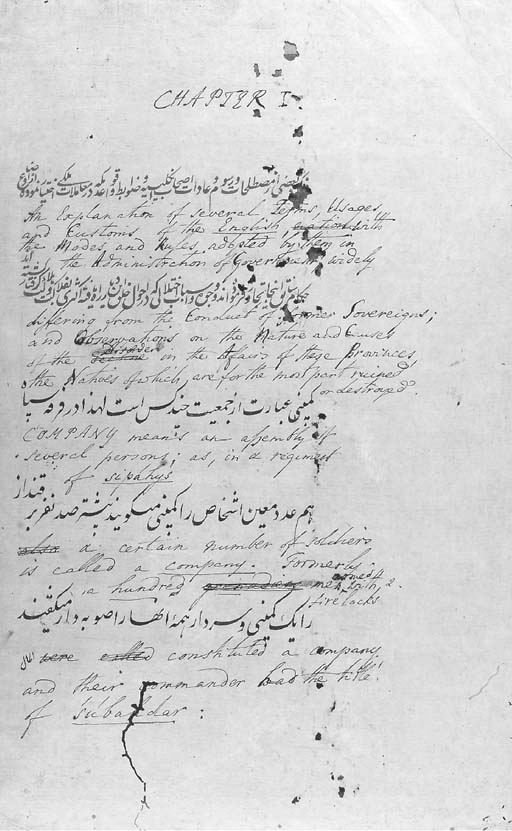

"Sir William Jones, From the Picture in the Hall of University College, Oxford"
Source: http://www.wmcarey.edu/carey/portraits/portraits.htm
(downloaded Nov. 2004)

Sir William Jones works on translating a Persian history of India since Aurangzeb
Source: http://www.christies.com/LotFinder/search/LotDetail.asp?sid=&intObjectID=3949419&SE=CMWCAT04+734200+%2D605447560+&QR=M+1+4+Aqc0000900+661543++Aqc0000900+&entry=india&SU=1&RQ=False&AN=5
(downloaded July 2002)
"JONES, Sir William (1746-1794, orientalist and jurist). Manuscript (scribal) of part of Ghulam Hussain Khan's Siyar-ul-mutakherin [a history of India from the death of Aurangzeb in 1701 to 1781], in Persian, written in a nasta'liq script in black ink with chapter headings in red, including an interlinear AUTOGRAPH TRANSLATION in English by Jones of the first 44 pages, annotated by him on the first leaf ('Observations on the Administration of Government and Justice by the English Nation in India extracted from the Persian History of Gulam Husain Khan') and in a different hand on the last leaf, n.p. [Calcutta], n.d.[1783-1794], the translation including cancellations and revisions, the manuscript comprising altogether 208 pages, folio (worming in first 15 leaves, mostly in lower margins, touching a few words), blanks, Middle Hill boards (spine weak, label torn). Phillipps MS 17138."
"Jones's translation is of Chapters I and II, including a summary of the 'Terms, Usages and Customs of the English', including the powers of the sovereign; military and other ranks; and the system of elected representation: 'The sultan of that nation is called King; who, although he be the sole executive power yet makes no laws or ordinances without the consent of the lords of his council, and the members of his national assembly; nor if he were to make them would they be obeyed'. This is followed by criticism of the English administration and of double standards, 'the Causes of those Events which have produced Disorder in the Government of these Provinces, the Desertion of Districts, and the Misery of the Subjects', compounded by the local rulers and the greed of indigenous middlemen. The translation breaks off in mid-sentence in a passage on punishments.William Jones, the leading orientalist of his day was 'one of the greatest polymaths in history' (Richard Gombrich, in Sir William Jones. A Commemoration, 1998). A fellow of University College, Oxford, and a member of Johnson's Literary Club, he was acquainted with Burke and Gibbon, visited Franklin in Paris, and was a close friend of the 2nd Earl Spencer, his former pupil. The first English scholar to master Sanskrit, he was the author of a Persian Grammar and of works on orthography, botany (corresponding with Banks), Persian and Indian music, literature, history, myth and religion. He pioneered the translation for European readers of the great works of oriental literature. In 1783 Lord Shelburne supported his appointment as a Judge of the High Court in Calcutta, where he remained until his death in 1794. The present translation may have been connected with the law digest which was one of his unfulfilled projects.
In a letter of 24.10.86 to Sir Charles Boughton-Rouse Jones writes of 'an excellent impartial modern History of India from Muhammad Shah to the late Revolution at Benares, containing very just Remarks on the Administration of Government and Justice of our Nation. The Author is a venerable old man named Ghulam Husain'. Ghulam Hussain Khan, of Persian origin, had close links with the British, and the Siyar-ul-mutakherin was his chief work."
![]()
"... in the opinion of Sr. William Jones, pointedly allusive to the GENERAL DELUGE."
Source: ebay, Oct. 2004
"Wood engraving from the 1790's. "The first Indian AVATAR, denominated
that of MATSE; representing the incarnation of VEESHNU in the form of A
FISH: in the Opinion of Sr. William Jones, pointedly allusive to the GENERAL
DELUGE."
| == INDIAN ROUTES index == sitemap == Glossary == FWP's main page == |